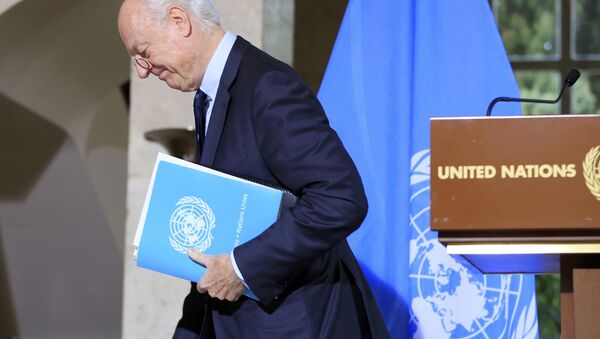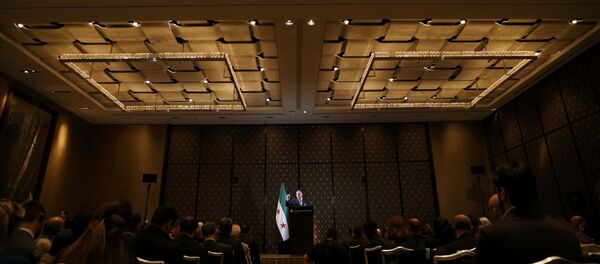"You will be hearing strong statements after mine, or in the next few days. I heard what I heard, during the private discussions or informal or formal discussions. I had a feeling that the sides want to find a dialogue. That's what matters," de Mistura said at a press conference after the conclusion of the almost two-week talks.
The Russian delegation at the Syrian peace talks in Geneva was greatly interested in the success of the settlement process, de Mistura.
"The Russian delegation, which came here at a very high level, actually had a very pressing interest in pushing for Geneva to produce some type of momentum… We are not hostages of Astana, but we are very much complementary," he told reporters in response to a question on whether Geneva was dependent on the Russian-Turkish-Iranian-backed ceasefire talks in Astana.
In this round of talks, de Mistura said, the participants have worked out a clear agenda for Syria settlement, reflected by four baskets, the forth of which addresses the issues related to counterterrorism.
"I think that we have a clear agenda now, in front of us, the agenda is reflected by the baskets, four baskets three plus one … The additional basket … addresses the issues related to strategies of counterterrorism, security governance and also medium-term confidence-building issues," he said, adding that the sides agreed to discuss all four "baskets" in parallel.
At the same time, he noted that proximity talks at the moment is more effective format for discussions on Syria settlement than direct negotiations between opposition and the government.
"While it remains our goal to secure an agreement between the government and the opposition, we have noticed and that was the case in Astana-2, that at the moment in fact it is more effective to have proximity discussions like we have had this time," de Mistura told reporters.
He added that Astana talks, that took place on February 15-16 and resulted in the agreement of the participants to set up a ceasefire monitoring group comprising Iran, Russia and Turkey, reinforce Geneva format.
"Astana and Geneva are complementing themselves and reinforcing each other… While Geneva in the fourth basket we will be addressing naturally what is the strategy regarding terrorism or counterterrorism and see what can be done in order to address that, in Astana they are expected to actually address the issue of counterterrorism," de Mistura said.
A new meeting in Astana on Syria is expected on March 14, according to Sputnik's sources, and the fifth round of the intra-Syrian talks in Geneva will most likely take place later in March, according to de Mistura.
“On the basis of the indications that I will be getting both from the Secretary General [UN] and the Security Council, I am planning to invite the Syrian invitees back here in March for a fifth round,” De Mistura said at a press briefing, noting that no new parties will be invited.
De Mistura also hinted at possible resignation from the post of UN special envoy for Syria, jokingly saying he would discuss with his wife whether to continue his work.


